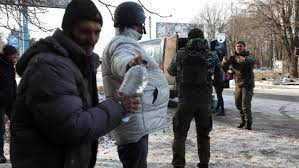Bakhmut (Ukraine) (AFP): First Valentyna’s gas was cut when Russia’s invasion came to Bakhmut in Ukraine’s Donetsk region. Then shelling destroyed power lines. By August, she and her daughter Natalia no longer had water.
As fighting intensified — making the battle for the city the longest and most grinding of the nearly year-long war — the pair replaced gas and electricity with wood and coal.
But when it became too dangerous to reach the well in their eastern neighbourhood, which has seen some of the worst fighting, they finally undertook the treacherous journey across the Bakhmutovka river to flee the besieged city.
“A week ago it was possible to live there, but not anymore,” said Natalia, 52, as she and her 73-year-old mother waited at a humanitarian hub to be evacuated.
They are just two among some 8,000 Bakhmut residents whose precarious existence in the city has been thrown into even greater uncertainty since water supplies were fully cut in October.
The city, which had a population of 70,000 before the war, had been battling to keep water flowing since March, when shelling knocked out a canal that was one of the main sources, along with two wells.
Authorities tried to repair power lines key to pumping water into treatment plants and tanks or employ workarounds, but efforts stalled as shelling mounted.
‘Dream’ of taking a shower
“Drinking water is now supplied to the city entirely by volunteers,” deputy head of the Bakhmut military administration Oleksandr Marchenko, told AFP.
At one humanitarian hub last week, a line of volunteers passed a nearly endless stream of multi-litre bottles of water into the space packed with residents huddled on benches and holding steaming cups of tea.
The fire brigade distributes water for other needs and there are scattered private wells, but residents also resort to gathering water from places it collects in the street, Marchenko added.
It’s a safer option than risking the river, which bisects the city and is now a key dividing line in the fighting.
Before Svitlana moved across the river with her husband and five-year-old son, they crossed a ruined bridge under heavy shelling several times to fetch water, once lugging back 36 litres and rationing it for a week.
“We have not had water since early in the war,” the 38-year-old said, watching her son play in the boxing ring-cum-play area in the shelter opened by the organisation Unity of People.
Sand bags are piled against the windows and the air is thick in the warm, busy former boxing gym.
“My dream is to take a shower,” Svitlana said, miming the hand sanitiser and towelettes bathing routine she’s relied on for months.
That dream may be closer than she thinks.
Russia closing in
Even as Russian forces report small gains towards Bakhmut, volunteers are working to drill a well at the bottom of the building, with another part transformed to house new shower stalls and washing machines.
Ruslan Khublo, 33, studied engineering and responded to a call on Instagram for help on the project.







